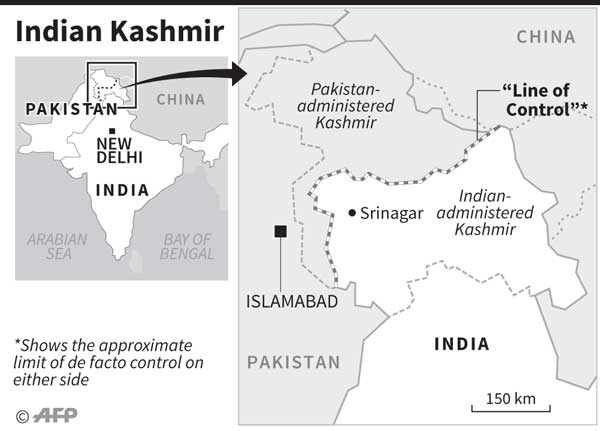Reply To:
Name - Reply Comment
Last Updated : 2024-04-17 00:06:00

Like a volcano that erupts every now and then throwing out lava, Kashmir this week exploded. Instead of lava, blood flowed as more than 30 Kashmiri protesters were killed in four days of protests and  clashes with Indian security forces.
clashes with Indian security forces.
The authorities imposed day-long curfews while hospitals struggled to cope with a large number of wounded people, most of whom were suffering eye injuries as the security forces were firing pellets at their faces.
The protests erupted following the death of a popular Kashmiri freedom fighter, Burhan Wani, whom India and the Indian media called a terrorist.
Arguments over who is a terrorist and who is a freedom fighter apart, the disturbances, the deaths or the dreams of the people in this disputed region will not make Kashmir an urgent international issue. However, Kashmir, over which India and Pakistan have fought two major wars and many battles, has been on the United Nations agenda for the past 68 years, albeit dormant. Like the Palestinian issue, the Kashmiri dispute is another example that in world politics, justice has little place. What matters is power. Powerful nations set the global agenda.
What was the response of the United States to the bloodshed in Kashmir? In deference to the United States’ growing military and strategic alliance with India amid China’s military rise, Washington said that what was happening in Kashmir was an internal matter for India, though a State Department spokesman diplomatically added, “Obviously, we’re concerned about the violence…. We encourage all sides to make efforts towards finding a peaceful resolution.”
As the death toll was rising in Kashmir, United Nations Secretary General Ban Ki-moon issued a statement on the situation in South Sudan, reminding UN members about their responsibility to protect the innocent people caught up in a war situation. His office reacted to the Kashmiri situation only after a Pakistani journalist remarked that the Secretary General had brushed aside the Kashmiri issue.
“No one is denying that we are concerned about the situation in Kashmir. The fact that the Secretary General did not raise it as he did not raise many other critical situations around the word does not mean he is brushing anything aside,” Stephane Dujarric, the UN spokesperson said.
Later Ban’s office issued a statement saying: “UN Chief Ban Ki-moon calls on all parties to exercise ‘maximum restraint’ to avoid further violence in Kashmir and hopes that all concerns would be addressed through peaceful means.”
The Secretary General appears to be more concerned about running the administration of the UN – paying salaries, changing bulbs and cleaning toilets – than policies or principles to protect people or children caught up in wars, as his recent surrender to Saudi Arabia indicates when the oil kingdom threatened to withdraw funds to the world body. Bowing under pressure is nothing new to Ban. During the 2010 Kashmir uprising, with the death toll reaching more than 200, Ban, just new to the office, issued a bold statement. India thought it amounted to internationalising the Kashmiri issue. Within 24 hours of issuing the statement, the Secretary General’s office withdrew it under pressure from India.
But there is no gainsaying that the dispute demands international attention. This is because it can trigger a nuclear war between neighbours India and Pakistan. It is the only issue that prevents the takeoff of the South Asian Association for Regional Countries (SAARC) as a viable economic bloc. It also figures prominently in India’s suspicion-ridden relations with China. So, the sooner the Kashmiri dispute is made a high priority international issue and a solution is found, the better it is for India, Pakistan, the region and above all the people of Kashmir, who have suffered enough without peace.
As an initial step towards this search for peace, India and Pakistan should remove the hangovers of the past. What matters are the lives of people -- not abstract concepts such as sovereignty. Leaders of the two countries should de-politicise Kashmir and look at it from a humanitarian angle.
Booker prize winning writer Arundhati Roy was bold enough to say, “Kashmir has never been an integral part of India. It is a historical fact. Even the Indian government has accepted this.”
But she remains condemned by the hardliners, who believe justice and peace are subservient to sovereignty and national pride.
Kashmir remains a no-go zone for the world media and the human rights rapporteurs and commissioners. There is hardly any independent inquiry among Indian academia or journalists into what’s going on in Kashmir. Public opinion is largely shaped by government statements.
Now with a Hindutva- backed government at the helm of affairs in New Delhi, sadly emotions are running high with the Kashmiri people’s freedom struggle being demonised as a terrorist problem that requires the shock and awe treatment that George Bush and his war coalition adopted to force Iraq’s meekly surrender. India insists the whole of Kashmir – including the part now under Pakistan – is Indian territory in terms of the accession treaty the maharaja of Kashmir entered into with the Indian government in the wake of the 1947 invasion by Pakistani tribesmen.
India says the Kashmiri crisis is a law and order problem. Whenever Pakistan urges that India respects the UN Security Council resolution that calls for a plebiscite in the Muslim-majority Kashmir to decide on the fate of the state, India cites regular elections it holds in the state as proof to show that the Kashmiris have accepted India’s sovereignty.
But those who oppose India’s control of the state ask how the elections could be free and fair when the state has the dubious reputation of being the world’s most militarised region: some 700,000 Indian troops control 12.5 million Kashmiris. They say people go to vote for fear of being labelled as rebel supporters. They fear the fate that befell 8,000 people who have disappeared in the past two decades. They fear the horror of their women being raped during raids by security forces.
But funerals have become a silent mode of protest in Kashmir and a message to India that the peace it claims to have brought into the region is nothing but the peace of the graveyard. Every time a Kashmiri is killed in the valley, people in their thousands gather for the funeral, making it a powerful political statement.
On July 8, when a Burhan Wani, the 22-year-old young rebel commander who used social media to convey his messages of freedom, was gunned down in a clash with security forces, the people in the valley gathered in unprecedented numbers for his funeral. The Kashmiri people yearning for freedom decided it was time again to rise up and confront the Indian forces. Shouting ‘India, leave Kashmir,’ the youth threw stones at the troops. An angry mob drowned a policeman by pushing his car into a river.
The government blocked the Internet and mobile services, preventing the news from reaching the outside world. The troops armed with the Armed Forces Special Powers Act, which effectively gives them immunity from prosecution, fired at will. Let alone pressure, there is hardly any whimper from the western nations. There is no Geneva resolution. For India is
not Sri Lanka.

Add comment
Comments will be edited (grammar, spelling and slang) and authorized at the discretion of Daily Mirror online. The website also has the right not to publish selected comments.
Reply To:
Name - Reply Comment
On March 26, a couple arriving from Thailand was arrested with 88 live animal
According to villagers from Naula-Moragolla out of 105 families 80 can afford
Is the situation in Sri Lanka so grim that locals harbour hope that they coul
A recent post on social media revealed that three purple-faced langurs near t